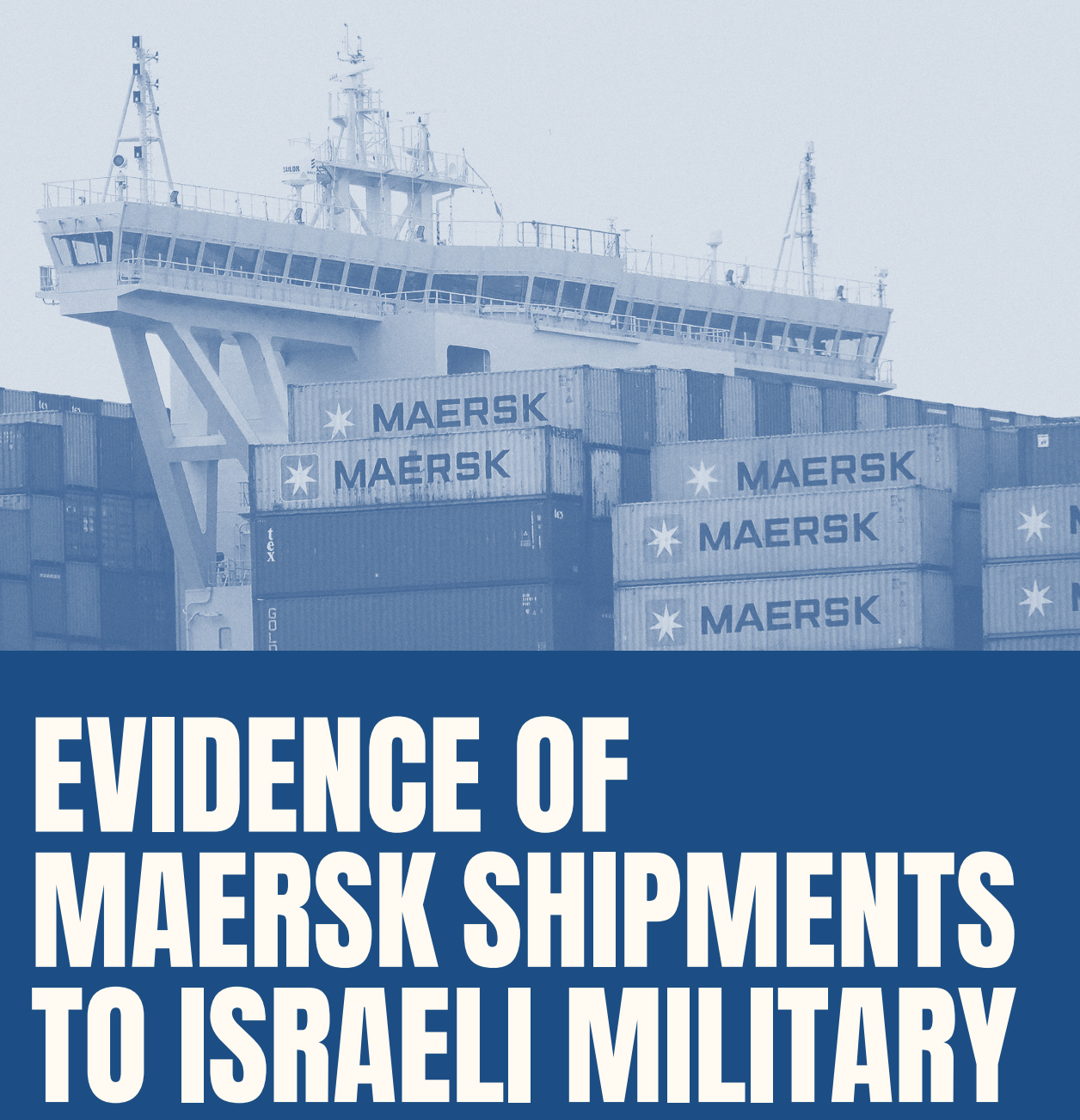Amid the escalating Gaza genocide, the spotlight has fallen on Denmark and its corporate shipping giant, Maersk, as accusations mount over their roles in supporting Israel’s military operations. From facilitating arms delivieries to defending controversial trade policies, Denmark and Maersk are at the center of a growing global outcry.
Maersk’s Role: Military Cargo and Activist Backlash
The “Mask Off Maersk” campaign, launched by the Palestinian Youth Movement and other advocacy groups, accuses Maersk of transporting over 2,100 military shipments to the Israeli Ministry of Defense between September 2023 and September 2024. These shipments allegedly included tactical vehicles, tank components, aircraft parts, and artillery systems. According to the report, Maersk’s shipments were instrumental in enabling Israel’s military operations in Gaza, including the deployment of Namer Armored Personnel Carriers (APCs) and Oshkosh tactical vehicles.
The report revealed that nearly 1,000 tons of military cargo were shipped weekly, predominantly from the Port of Elizabeth, New Jersey, transiting through Algeciras, Spain, before reaching Israel. Critically, over 35% of shipments carried incomplete or vague cargo descriptions, with some labeled as “diplomatic cargo,” raising concerns about transparency and potential misuse of international shipping regulations.
Further scrutiny highlights that Maersk played a critical role in facilitating the supply chain for U.S.-funded military contracts with Israel, such as a $238 million deal for Namer APC engines and a $159 million agreement for Oshkosh vehicles. These shipments have raised ethical concerns about corporate complicity in the ongoing conflict.
International Developments: Spain and Morocco’s Diverging Responses
The controversy surrounding Maersk’s operations took a significant turn when Spain recently denied docking permissions to two Maersk-operated vessels—the Maersk Denver and Maersk Seletar—suspected of carrying military cargo to Israel. The Spanish government justified its decision by citing policies against allowing military equipment destined for conflict zones to transit through its ports.
Despite Spain’s embargo, the report alleges that Maersk continued to route shipments through Algeciras, with over 900 shipments transiting the port after the embargo was announced. Meanwhile, Morocco allowed the Maersk Denver to dock in Tangier, sparking widespread protests among Moroccan citizens accusing their government of enabling arms shipments that exacerbate violence in Gaza.
Denmark’s Political Position: Arms Trade and War Crimes Allegations
While Maersk faces scrutiny for its logistical role, Denmark’s government is under fire for its political complicity. In June 2024, Danish Foreign Minister Lars Løkke Rasmussen defended the government’s decision to continue arms sales to Israel, even as accusations of Israeli war crimes gained traction. Rasmussen controversially stated, “Even if there is basis for charging Israel with war crimes, it doesn’t change the fact that Israel has a right to self-defense.”
Danish arms exports to Israel, primarily components for U.S.-made F-35 fighter jets and armored vehicle systems, have faced sharp criticism. These exports are heavily tied to Israel’s bombardment campaigns, as highlighted by investigative reports.
Legal and Public Backlash in Denmark
Denmark’s policies have prompted legal challenges from organizations including ActionAid Denmark, Amnesty International Denmark, and the Palestinian human rights group Al-Haq. The coalition accuses the Danish government of violating international arms trade regulations, alleging complicity in war crimes.
Meanwhile, public dissent over Denmark’s alignment with Israel is growing. Demonstrations across the country and Copenhagen University’s divestment from companies linked to illegal Israeli settlements signal increasing civil resistance.
Maersk: A Broader Ethical Dilemma
For Maersk, the revelations surrounding its military cargo shipments underscore the ethical dilemmas faced by multinational corporations operating in conflict zones. Activists and governments alike have called for greater accountability, citing the company’s role in enabling Israel’s military operations.
The report also highlights instances of Maersk shipping goods to illegal Israeli settlements in the occupied West Bank, in violation of international law. Despite Maersk’s insistence that its shipments do not include weapons or ammunition, its logistical support for military supply chains has intensified global scrutiny.
As the Gaza conflict continues, the actions of Denmark and Maersk remain under intense scrutiny. Activists are amplifying their calls for transparency and accountability, urging Denmark to end its arms trade with Israel and Maersk to halt its military shipments. The unfolding developments have not only intensified the spotlight on Denmark’s policies but also raised critical questions about the role of corporations and governments in global conflicts.
Whether Denmark and Maersk choose to adapt to growing international pressure or persist with their current positions will likely shape their reputations on the world stage for years to come.




